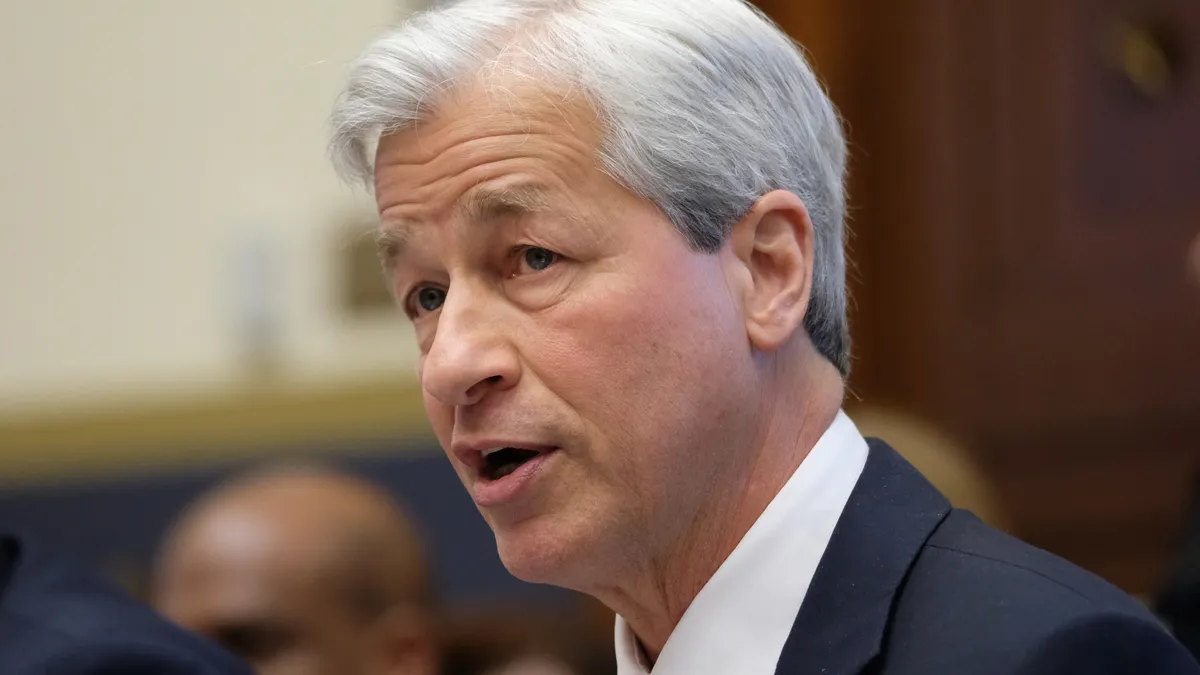JPMorgan Chase shareholders on Tuesday rejected the bank’s 2021 compensation plan for its six top executives — a proposal that included $52.6 million in option awards granted to CEO Jamie Dimon.
The measure received 31% support — the lowest such figure since 2009, when JPMorgan first sought shareholder input on pay. Often, the bank’s compensation proposals have found backing from 90% or more of investor votes. The previous low was 61.4% in 2015.
Dimon is unlikely to give back the award — the shareholder votes are nonbinding — but Tuesday’s result could influence the bank’s future payouts.
JPMorgan’s compensation and management development committee “will take into account the outcome of the vote when considering future executive compensation arrangements,” the bank said in a proxy filing ahead of the meeting, according to the Financial Times. And Dimon, at Tuesday’s meeting, said the board “appreciates the feedback received from shareholders regarding compensation.”
“The board takes it very seriously and we will continue to actively engage with them,” he said.
Dimon and other leaders are expected to address the pushback they’ve received over the bank’s spending at an investor presentation May 23, The Wall Street Journal reported.
The pay proposal’s rejection marked an effort by proxy advisers Glass Lewis and Institutional Shareholder Services to signal their discontent with awards they saw as excessive but also with company performance they saw as underwhelming.
JPMorgan shares were trading at $121.04 at the stock market’s opening bell Tuesday — a 28% drop from mid-January. Under the structure of Dimon’s payout, he’ll receive the award only if the bank’s stock appreciates past $148.73 per share in the coming years.
Alan Johnson, managing director of pay consultancy Johnson Associates, told Bloomberg the tepid support for JPMorgan's compensation plan is “a little embarrassing” for the bank.
JPMorgan in July gave CEO Jamie Dimon a “special award” of 1.5 million share options, reflecting the board’s “desire” that he “continue to lead the Firm for a further significant number of years,” according to a securities filing.
The bank gave a similar, though lesser, award of 750,000 restricted share options — valued at roughly $27.9 million, in December to the bank’s second-in-command, Daniel Pinto.
“The board is acting responsibly in shareholders’ best interests in case Mr. Pinto needs to once again serve as CEO as a result of unforeseen circumstances,” the bank said in response to Glass Lewis’ recommendation, according to Bloomberg.
Pinto and now-retired co-president Gordon Smith served as acting co-CEOs in March 2020, when Dimon needed emergency heart surgery.
“The lack of performance-based vesting conditions tied to the awards while the Company has not achieved adequate alignment between executive pay and performance warrants shareholders’ scrutiny,” Glass Lewis wrote. “Shareholders should generally be wary of awards granted outside of the standard incentive schemes, as such awards have the potential to undermine the integrity of a company's regular incentive plans, the link between pay and performance or both.”
JPMorgan wouldn’t be the only bank whose one-off awards rankled Glass Lewis. The proxy adviser recommended shareholders vote down Goldman Sachs’ executive compensation for similar reasons. Goldman in October offered CEO David Solomon and President John Waldron stock incentives worth $30 million and $20 million, respectively, in a move meant to “ensure leadership continuity” at least through 2026, the bank wrote in a filing at the time.
Glass Lewis’ warning on Goldman didn’t stick. Approximately 82% of votes cast at that bank’s annual meeting April 28 favored the compensation packages.
Glass Lewis noted a “sustained disconnect between executive pay and performance over the last nine years” at JPMorgan Chase. “Historically, the Company's size relative to peers has helped to mitigate some of our concerns,” it said.
Dimon's compensation during the past fiscal year was 3.4 times the median of the bank’s financial peers, Glass Lewis asserted. But the bank’s revenue and employee count stood at about 1.9 times that measure.
JPMorgan posted a net profit for 2021 that exceeded its previous record by 32.7% but saw its net income dip 14% amid a double-digit percentage-point drop in trading revenue and a double-digit uptick in operating expenses.
“While it is important to recognize that the awards vest over a longer time frame than the Company's regular equity incentives, we do not believe this fully alleviates concerns around the magnitude of the grants and what we consider their insufficient structural integrity,” Glass Lewis wrote. “Half of the awards are subject to protection-based vesting conditions, which are off-shoots of typical clawback provisions but are not sufficient substitutes for rigorous performance-based vesting conditions.”
The proxy adviser gave JPMorgan’s executive compensation plan a “D” rating — which is not the worst grade it has bestowed. (It gave the bank an F last year.)
JPMorgan, in a statement seen by Bloomberg, defended its award to Dimon, saying it “incentivizes a successful leadership transition by requiring the CEO’s leadership for at least five years before the awards vest and another five years until he may sell any vested shares.” That, the bank added, “ensures direct alignment with shareholder returns over the next decade.”




















